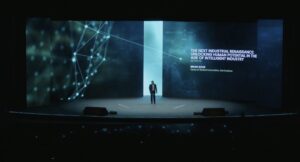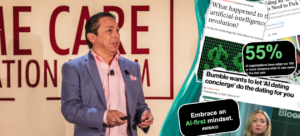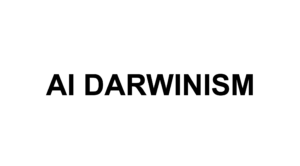
Digital transformation is more important now than ever, but some organizations are more difficult to change than others.
I love it whenI get to join Karen Roby on her TechRepublic show. Each time, we discuss leading business technology news and trends and I honestly geek out each time. In our latest episode, we explore the hurdles facing organizations and how to overcome them as they go through digital transformation. We also explore some highlights from the Salesforce Dreamforce 2019 event. Video here. Transcript below.
Brian Solis: Digital transformation means a lot of different things to a lot of different people. I’ve been covering it for the better part of a decade now. Originally, digital transformation really was about migrating to the cloud and modernizing a lot of business infrastructure to essentially allow companies, or organizations, to be more agile and scalable as new technologies come and go. But I think that, in and of itself, was limiting, it was an initial hurdle because it didn’t necessarily give digital transformation a sense of purpose. It just gave it a sense of a roadmap, essentially, of technologies to adopt and test and then scale.
But I’ll tell you that, more often than not, the biggest challenges I hear are twofold. One is, legacy infrastructure is really difficult to update and upgrade. A lot of these systems are so old but so integrated into the organization that trying to update those with a rip and replace is essentially going to cause havoc. And that’s what a lot of companies are worried about, so they’re trying to take it a little bit slowly, a little bit more strategically.
The other one is mindset. This one, it comes up in pretty much all of the cases of digital transformation. And by that I mean, what is possible with digital transformation if your perspective is rooted, still, not only in legacy systems, but also legacy ideals of what technology can do for the organization: What the market looks like, how an organization should run, what are operational models to support tech, and so on.
Karen Roby: Do companies really even have a choice anymore? Or do they really just have to have the mindset that they must be digitally focused?
Brian Solis: One of the challenges when I study things like innovation, that I hear about, is that culture is actually one of the biggest inhibitors of all things, all progress. Sometimes when I interview executives around culture or innovation or digital transformation, I sometimes feel like I’m not an analyst, that I’m a therapist. A lot of executives actually want to share their frustrations, and one of the frustrations, especially with more, let’s just say, legacy-oriented organizations, I’ll hear about millennials all the time. And then also the coming of centennials. In that they do want to work differently, they do think differently, and infrastructures, and also models, don’t necessarily support that way of thinking and way of working. The consumerization of technology, it hasn’t just affected millennials or the younger workforce, it’s affected all of us.
I think, anybody who has a smartphone or uses social media, or has ordered an Uber or Lyft, or DoorDash, or Postmates, you name it, we have, as human beings, radically transformed. Our brains have radically transformed as we use more of these technologies, we’re multitasking, we’re doing a million things. Employees get something like 200 notifications during their work day, just from their phone and social and email. So a lot of the way that we have to think about work has to change. We have to think bigger than the millennial workforce. We have to give technology that sense of purpose of how should people work. And that means that we have to spend more time looking within the organization, beyond assessments and audits and 360 reviews, to get a better sense of how they want to work and then how we could bring the workforce, not just into a modern era, but modernizing the definition of work itself.
Karen Roby: I know you just got back from Dreamforce, and of course that is one of the big concepts that people are just talking about nonstop there, Brian, is digital transformation. What were some of the things that you were hearing and some of the things that people are talking about as we’re heading into 2020?
Brian Solis: Salesforce was a big champion of the modernization of the overall business, the overall enterprise. All of their products, all of their announcements, were really looking at, not just modernizing groups but also bringing groups together. So Truth was a real big pillar at Dreamforce.
Truth was looking at, for example, the customer truth. Who is the customer throughout the journey? Not just in any one fragment of that journey. And voice and AI were also big, big, big topics at the event. And really trying to help IT, but also business executives, think differently about, not just, obviously, integrating Salesforce into the organization, but rethinking, kind of like what we were talking about, rethinking the opportunity for business modernization as a whole. That’s really what this is about.
And in fact, if I could just share with you a quick definition of digital transformation. In my research, I’m trying to help modernize this for people, which is, the evolving pursuit of innovative and agile business and operational models, fueled by evolving technologies, processes, analytics and talent, to create new value for customers, employees and stakeholders. And I think, maybe if you pause and play that back as you’re watching this, that’s really not just Dreamforce, or Salesforce as an organization, that’s how every, I think, executive, whether you’re an IT or you’re a CXO, CEO, or especially if you’re a board member or shareholder, we have to push businesses beyond just the topic of digital transformation. We have to really look at this as business modernization. We’re competing against digital natives, we’re competing against digital disruption, and that takes not just new technology or infrastructure, but a new mindset as well.
Karen Roby: I think that’s actually a really great definition there, Brian. And certainly there are so many balls in the air, and I think that’s what makes this so confusing is there are so many different parts and things to consider. When you talk about just a business and a company size, you have from a huge enterprise down to these small companies, small businesses in particular, it seems, really face an uphill battle when it comes to making these kinds of changes. Do you find that?
Brian Solis: When we really started looking at the bigger picture, what we’re really talking about is change management, and that’s not the sexiest of conversations to have. The topic of change management in and of itself is probably in need of change management because it’s so big and it’s so daunting. But, honestly, I think the greatest stories I’ve ever seen, if you’re watching this, I published a paper a couple of years ago called, The Six Stages of Digital Transformation, and as you look at the more progressive organizations, where innovation and agility become sort of the norm, essentially what we’re watching is these cross-functional segments coming together, at least early on as a stakeholder group, as a steering committee, if you will. Because, if you look at customer experience, that tends to be the number one unifier within the organization, with giving digital transformation a purpose.
For example, if we can look at the customer journey, we can see exactly how mobile and social and the app economy and all of these different things are coming into the picture and we can see what’s broken. You can point digital transformation, or at least the modernization of technology, right at things that are going to have immediate ROI so that we could attach some meaningful metrics to at least the early digital transformation initiatives. So that while you’re migrating things to the cloud, while you’re doing bigger, more infrastructure-focused investments, we can also look at other investments across the journey, across functions, that are going to have immediate payoffs and that are actually smaller in their efforts.

Brian Solis | Author, Keynote Speaker, Futurist
Brian Solis is world-renowned digital analyst, anthropologist and futurist. He is also a sought-after keynote speaker and an 8x best-selling author. In his new book, Lifescale: How to live a more creative, productive and happy life, Brian tackles the struggles of living in a world rife with constant digital distractions. His previous books, X: The Experience When Business Meets Design and What’s the Future of Business explore the future of customer and user experience design and modernizing customer engagement in the four moments of truth.
Invite him to speak at your next event or bring him in to your organization to inspire colleagues, executives and boards of directors.





Leave a Reply